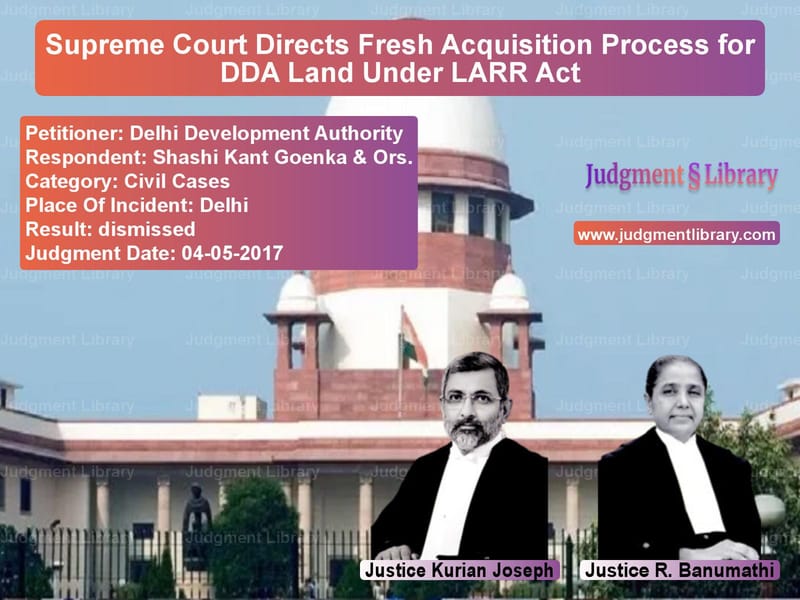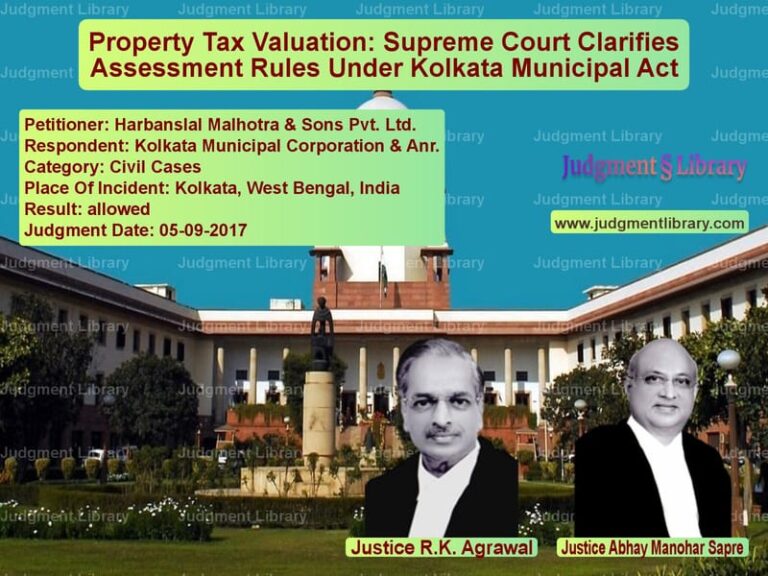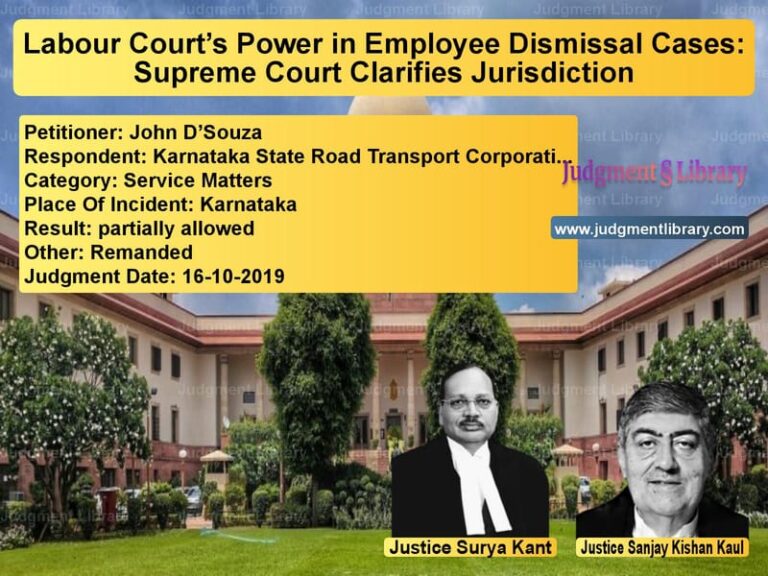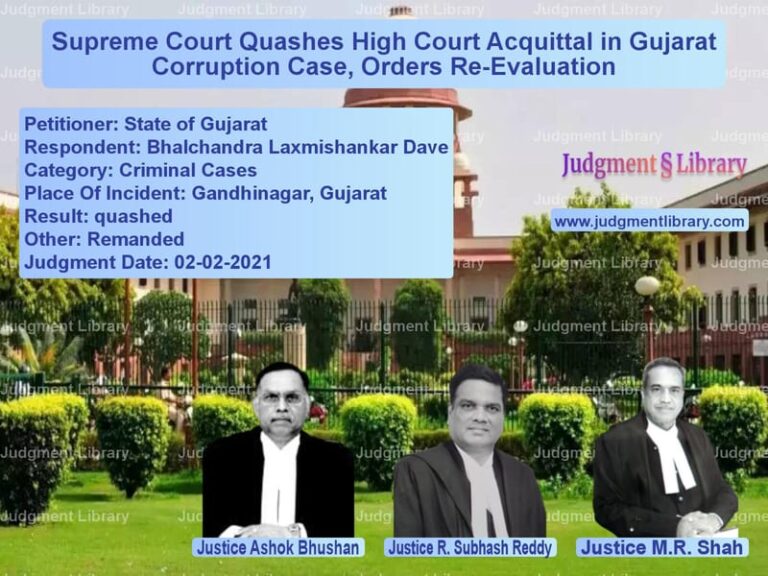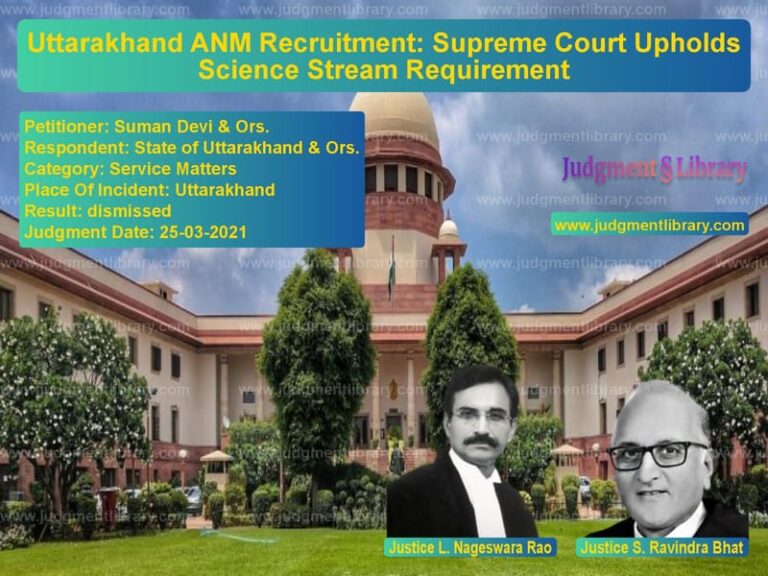Supreme Court Directs Fresh Acquisition Process for DDA Land Under LARR Act
The Supreme Court in Delhi Development Authority vs. Shashi Kant Goenka & Ors. addressed a significant issue concerning land acquisition under the Right to Fair Compensation and Transparency in Land Acquisition, Rehabilitation and Resettlement Act, 2013 (LARR Act). The case revolved around whether the Delhi Development Authority (DDA) could retain possession of land acquired under the previous Land Acquisition Act, 1894, or if fresh acquisition proceedings were required under the 2013 Act.
Background of the Case
The appellant, Delhi Development Authority (DDA), had acquired land under the old Land Acquisition Act, 1894. However, the respondents, Shashi Kant Goenka & Others, challenged the acquisition, arguing that under Section 24(2) of the LARR Act, the acquisition had lapsed because compensation was not paid and possession was not taken.
The Supreme Court was tasked with determining whether the previous acquisition remained valid or if the DDA was required to follow fresh acquisition proceedings.
Legal Issues Involved
1. Applicability of Section 24(2) of the LARR Act
The respondents argued that under Section 24(2) of the 2013 Act, if compensation had not been paid and possession had not been taken, the acquisition would lapse.
2. Validity of the Land Acquisition Process
The Supreme Court examined whether the land in question was lawfully acquired under the 1894 Act and whether the DDA had the legal right to retain possession.
3. Obligation to Initiate Fresh Acquisition
The Court had to decide if the DDA was required to issue a new Notification under Section 11 of the LARR Act to lawfully acquire the land.
Arguments Presented
Petitioner’s (DDA) Arguments
- The land acquisition process was completed under the 1894 Act, and there was no need for fresh acquisition proceedings.
- The land had been lawfully acquired and vested with the government.
- The LARR Act did not mandate the initiation of fresh acquisition proceedings for land already acquired.
Respondents’ (Shashi Kant Goenka & Ors.) Arguments
- Under Section 24(2) of the LARR Act, the acquisition had lapsed since possession was not taken and compensation was not paid.
- The government was required to issue a new notification under Section 11 of the 2013 Act to lawfully acquire the land.
- The continued occupation of the land by the DDA was illegal and should be reversed.
Supreme Court’s Observations
The Supreme Court analyzed previous cases and made the following key observations:
- The issue had already been decided against the DDA in earlier judgments, including Civil Appeal No. 8477 of 2016 and Civil Appeal No. 5811 of 2015.
- Since fresh acquisition proceedings had not been initiated, the DDA could not lawfully retain possession of the land.
- The Court granted the DDA a period of six months to initiate acquisition proceedings afresh under Section 24(2) of the LARR Act.
Key Verbal Arguments by the Court
“The issue, in principle, is covered against the appellant by judgments in Civil Appeal No. 8477 of 2016 arising out of Special Leave Petition (C) No. 8467 of 2015 and Civil Appeal No. 5811 of 2015 arising out of Special Leave Petition (C) No. 21545 of 2015.”
“In the peculiar facts and circumstances of this case, the appellant is given a period of six months to exercise its liberty granted under Section 24(2) of the Right to Fair Compensation and Transparency in Land Acquisition, Rehabilitation and Resettlement Act, 2013 for initiation of the acquisition proceedings afresh.”
“We make it clear that in case no fresh acquisition proceedings are initiated within the said period of six months from today by issuing a Notification under Section 11 of the Act, the appellant, if in possession, shall return the physical possession of the land to the owner.”
Final Judgment
The Supreme Court ruled:
- The appeal was dismissed.
- The DDA was given six months to initiate fresh acquisition proceedings under the LARR Act.
- If no notification was issued within six months, the DDA was required to return possession of the land to the original owners.
- No costs were imposed on either party.
Significance of the Judgment
This ruling has important implications for land acquisition cases:
- It reinforces that possession and compensation are critical factors in determining whether an acquisition remains valid.
- It mandates that government agencies must follow due process under the 2013 Act when acquiring land.
- It ensures that landowners retain their rights if acquisition proceedings are not completed properly.
Conclusion
The Supreme Court’s judgment in Delhi Development Authority vs. Shashi Kant Goenka clarifies the legal framework for land acquisition under the LARR Act, ensuring that public authorities adhere to fair procedures when acquiring private land.
Don’t miss out on the full details! Download the complete judgment in PDF format below and gain valuable insights instantly!
Download Judgment: Delhi Development Au vs Shashi Kant Goenka & Supreme Court of India Judgment Dated 04-05-2017.pdf
Direct Downlaod Judgment: Direct downlaod this Judgment
See all petitions in Property Disputes
See all petitions in Damages and Compensation
See all petitions in Judgment by Kurian Joseph
See all petitions in Judgment by R. Banumathi
See all petitions in dismissed
See all petitions in supreme court of India judgments May 2017
See all petitions in 2017 judgments
See all posts in Civil Cases Category
See all allowed petitions in Civil Cases Category
See all Dismissed petitions in Civil Cases Category
See all partially allowed petitions in Civil Cases Category

